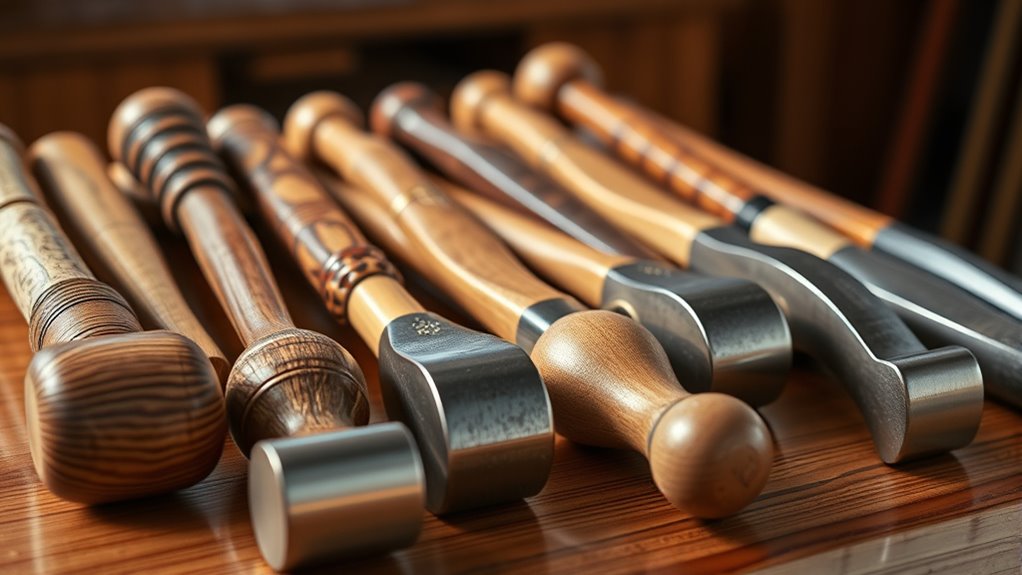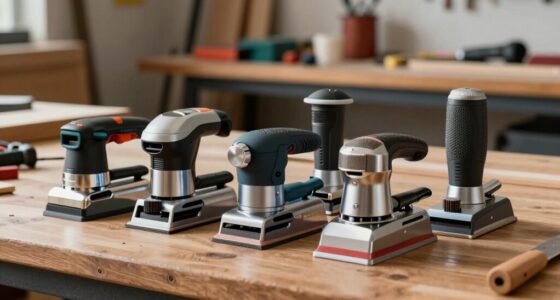If you’re exploring the best Japanese Gennou and carpenter hammers, I recommend checking out styles like the 375g Gennou with a wooden handle, the versatile Ohsho Gennou 21mm, or the precision KAKURI models with unique shapes like oval or square heads. These tools blend traditional craftsmanship with high accuracy, making them perfect for woodworking tasks. Curious about selecting the right one? Keep going, and you’ll discover detailed insights on each style’s features and uses.
Key Takeaways
- Highlight the craftsmanship of hand-forged Japanese carbon steel Gennou hammers with traditional shapes and multi-purpose faces.
- Showcase models with ergonomic handles made from Japanese oak, Cypress, or hickory, emphasizing control and durability.
- Detail various head designs, including double-sided, oval, square, and hourglass shapes tailored for precise woodworking tasks.
- Emphasize the balance, weight ratios, and craftsmanship that enhance precision and reduce fatigue during detailed work.
- Include notable brands and models like KAKURI, Ohsho, and Ion, known for blending tradition with modern accuracy.
Japanese Carpenter Hammer GENNO 375g (13.2 oz) with Wood Handle
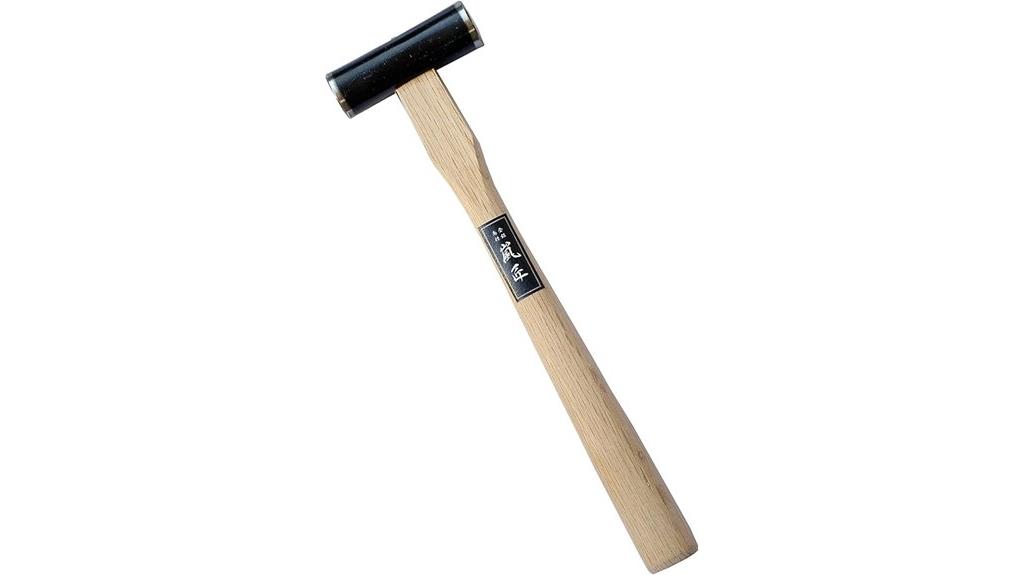
If you’re looking for a reliable hammer that balances tradition and precision, the Japanese Carpenter Hammer GENNO 375g is an excellent choice. Weighing 13.2 ounces, it features a double-sided head with a flat face for starting nails and a convex face for finishing blows, reducing wood damage. Its 13-inch length and tapered Japanese oak handle provide excellent grip and control. Crafted in Japan from high-quality carbon steel and natural oak, it’s meticulously assembled by skilled artisans. Whether for nailing, chiseling, or fine-tuning Japanese hand planes, this hammer offers durability, comfort, and precision for both professionals and hobbyists.
Best For: woodworking professionals and hobbyists seeking a precise, durable hammer for chiseling, nailing, and fine adjustments of Japanese hand planes.
Pros:
- Double-sided head with flat and convex faces minimizes wood damage during use
- Crafted from high-quality Japanese carbon steel and natural oak for durability
- Ergonomically tapered handle provides excellent grip, control, and comfort
Cons:
- Slightly heavier than some other hammers at 17.2 oz total weight, which may require more effort for extended use
- Length of 13 inches may be less maneuverable in tight spaces
- Designed primarily for woodworking, so less suitable for general construction tasks
Ohsho Gennou Hammer 21mm (Japan Import)

The Ohsho Gennou Hammer 21mm (Japan Import) stands out for those seeking a precise, high-quality tool backed by traditional Japanese craftsmanship. Measuring 14.2 inches long with a 4.1-inch flat head, it’s ideal for detailed nailing and removal tasks. Its head is made from wood, featuring a flat style for accuracy, while the hickory handle offers durability and comfort. Weighing about 13.3 ounces, this hammer combines German design with Japanese manufacturing expertise. Crafted by Susa in Japan, it emphasizes safety and precision, making it a reliable addition to any carpentry toolkit. Its compact size and traditional materials ensure both effectiveness and a genuine craftsmanship experience.
Best For: DIY enthusiasts and professional carpenters seeking a precise, durable hammer with traditional Japanese craftsmanship for detailed nailing and removal tasks.
Pros:
- High-quality Japanese craftsmanship with durable wooden head and hickory handle
- Flat head design allows for accurate and controlled work
- Compact size and lightweight for ease of handling and reduced fatigue
Cons:
- Limited to nailing and nail removal, not suitable for heavy-duty demolition
- May require careful maintenance to prevent wood cracking or rattling
- Imported from Japan, which could entail higher shipping costs or availability issues
KAKURI Japanese Carpenter Hammer GENNO
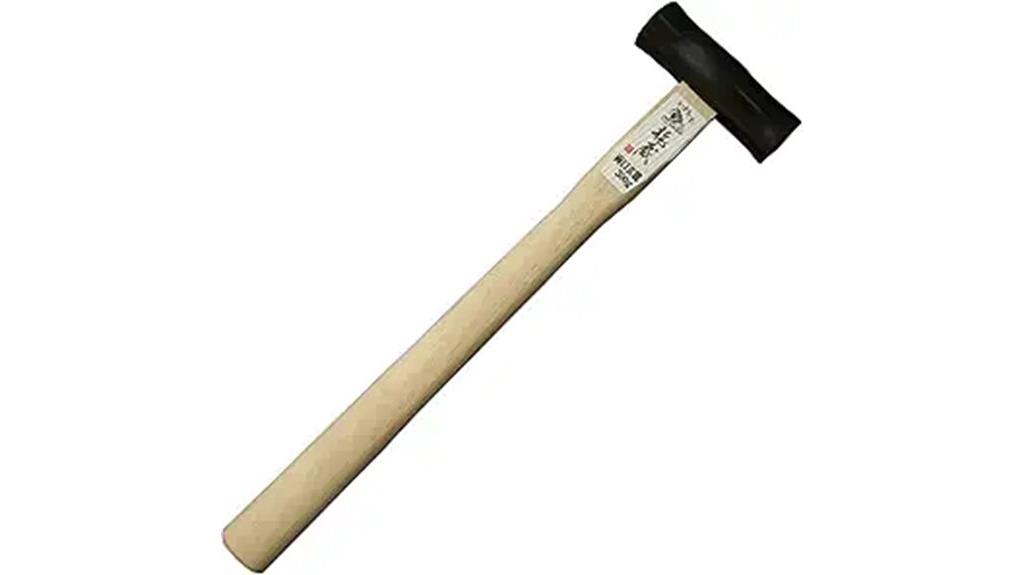
For woodworking enthusiasts and professionals seeking both precision and traditional craftsmanship, the KAKURI Japanese Carpenter Hammer GENNO stands out with its unique double-faced head. Crafted in Japan, this hammer features a flat side for nailing and a slightly domed, belled side for setting small nails or finishing without damaging the wood fibers. Its oval, hourglass-shaped head supports precise work, while the natural oak handle offers comfort and a secure grip. Made from high-quality Japanese carbon steel, it’s durable and reliable. With a balanced weight of around 370 grams, it’s perfect for detailed woodworking, carpentry, and craftwork—combining functionality with Japanese craftsmanship elegance.
Best For: woodworking enthusiasts, professional carpenters, and hobbyists seeking a precise, durable, and traditionally crafted hammer for detailed carpentry and finishing work.
Pros:
- High-quality Japanese craftsmanship with durable carbon steel head and natural oak handle
- Versatile double-faced head for nailing and finishing without damaging wood fibers
- Well-balanced design with an ergonomic oval-shaped head for precision work
Cons:
- Handle length and oval head may require careful handling for small nail tasks
- Regular maintenance like oiling needed to preserve handle and head quality
- Slightly heavier weight may be less suitable for very delicate or lightweight tasks
KAKURI Carpenter Hammer GENNO 10.5 oz (300g) Japanese Cypress Handle
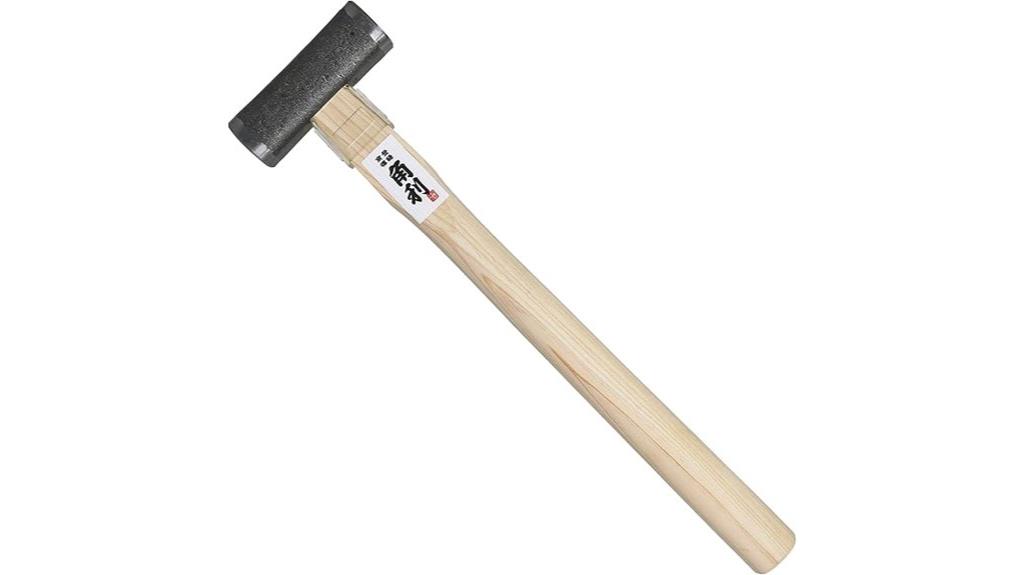
Carpentry professionals and serious hobbyists alike will appreciate the KAKURI Carpenter Hammer GENNO’s meticulous craftsmanship and thoughtful design. Its Japanese Cypress wood handle offers a lightweight, comfortable grip with a natural feel, perfect for precise work. The square head features a flat side for starting nails and a domed side for finishing, preventing surface damage. The heavy-duty cross-driven wedges ensure durability and secure fitting, while Japanese carbon steel provides reliable strength. Designed for balance and control, this hammer is versatile for adjusting planes, chiseling, and nailing. Handcrafted in Japan, it exemplifies the blend of tradition and modern craftsmanship, making it a valuable addition to any toolkit.
Best For: professional carpenters and serious woodworking enthusiasts seeking a high-quality, handcrafted hammer for precise and durable work.
Pros:
- Meticulous craftsmanship with traditional Japanese design elements
- Lightweight handle with a comfortable, natural feel for precise control
- Durable Japanese carbon steel head with dual-purpose flat and domed sides
Cons:
- Handle finish may be poorly executed, leading to potential discomfort or damage
- Some users report loose wedges and misaligned handles after use
- Occasional surface scars and dents on the handle, indicating inconsistent quality
KAKURI Small Double Face Japanese Carpenter Hammer
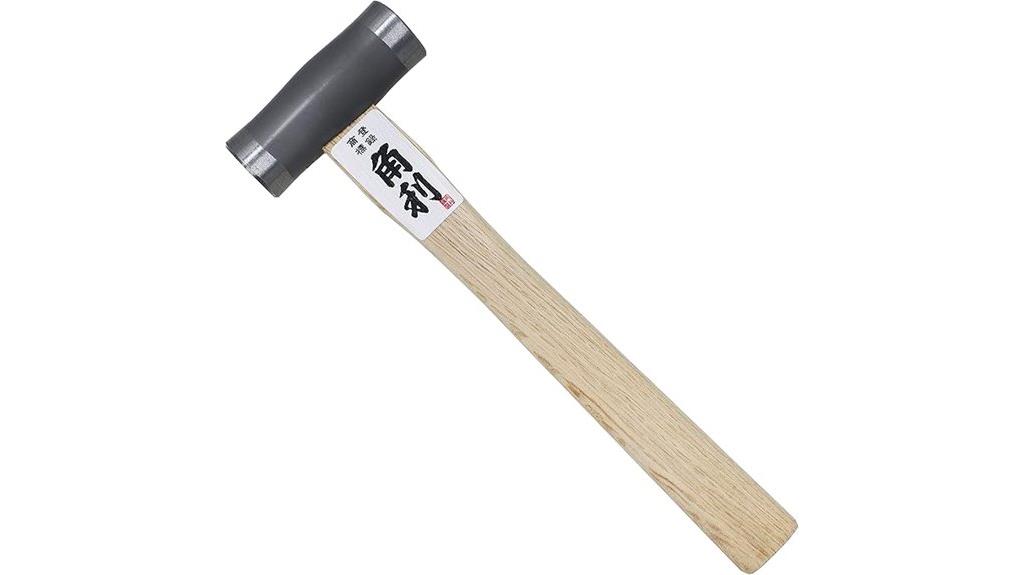
If you need a precise, lightweight hammer for detailed woodworking or crafts, the KAKURI Small Double Face Japanese Carpenter Hammer is an excellent choice. Its compact size and 6.5 oz head make it perfect for tight spaces and delicate tasks. Made in Japan, it features a traditional GENNO shape with a flat side for nailing and a convex side for finishing blows, reducing wood damage. The handle, crafted from Japanese oak, offers a comfortable, balanced grip. Constructed from forged carbon steel and tempered for strength, this hammer combines durability with precision, making it a reliable tool for fine woodworking, chiseling, and craft projects.
Best For: hobbyists, hobbyist woodworkers, and craftsmen seeking a precise, lightweight hammer for detailed woodworking, chiseling, and craft projects in tight spaces.
Pros:
- Compact and lightweight design for easy handling and maneuverability
- Traditional GENNO shape reduces wood damage during finishing tasks
- Crafted from durable forged Japanese carbon steel with a comfortable, contoured oak handle
Cons:
- Not suitable for heavy-duty or large-scale construction work
- Handle may lack a seal coat, requiring maintenance for long-term durability
- Limited to small projects, may not provide enough heft for demanding tasks
Japanese Carpenter Hammer with Nail Set Punch
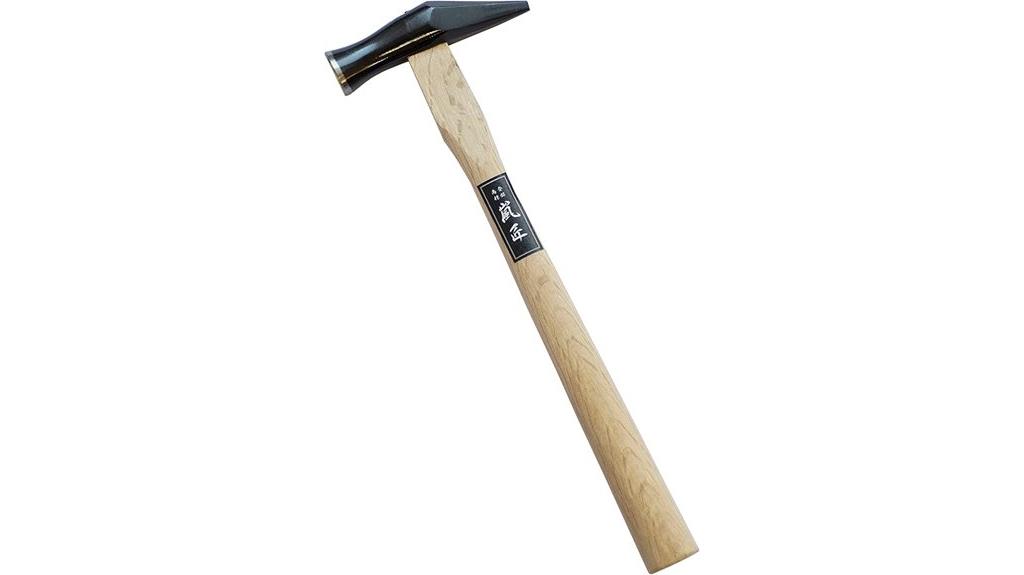
The Japanese Carpenter Hammer with Nail Set Punch stands out as an essential tool for professionals who demand precision and craftsmanship in finishing nails and small woodworking details. Its well-balanced, forged Japanese carbon steel head ensures efficient nail driving and final finishes without damage. The pointed punch face allows sinking nails below surface seamlessly, while the handle made from Japanese oak offers strength, comfort, and control. At 13 inches long and weighing about 13.7 ounces, it’s perfect for delicate tasks like tacking, small indentations, and restoring steel on Japanese plane blades. Meticulously crafted by seasoned artisans, this hammer combines tradition and precision for any serious woodworker.
Best For: Professional woodworkers and carpenters seeking a precise, durable hammer for finishing nails, tacking, and small woodworking details.
Pros:
- Well-balanced, forged Japanese carbon steel head for efficient nail driving and finishing
- Comfortable handle made from Japanese oak with contoured grip for improved control
- Versatile tool suitable for multiple tasks including nail sinking, tacking, and steel restoration on Japanese planes
Cons:
- Some users have reported heads detaching quickly, requiring repair with glue or epoxy
- Packaging issues may lead to loose or damaged heads during shipping
- Higher price point compared to standard hammers, which may not suit budget-conscious buyers
Ohsho Claw Hammer Middium (Japan Import)
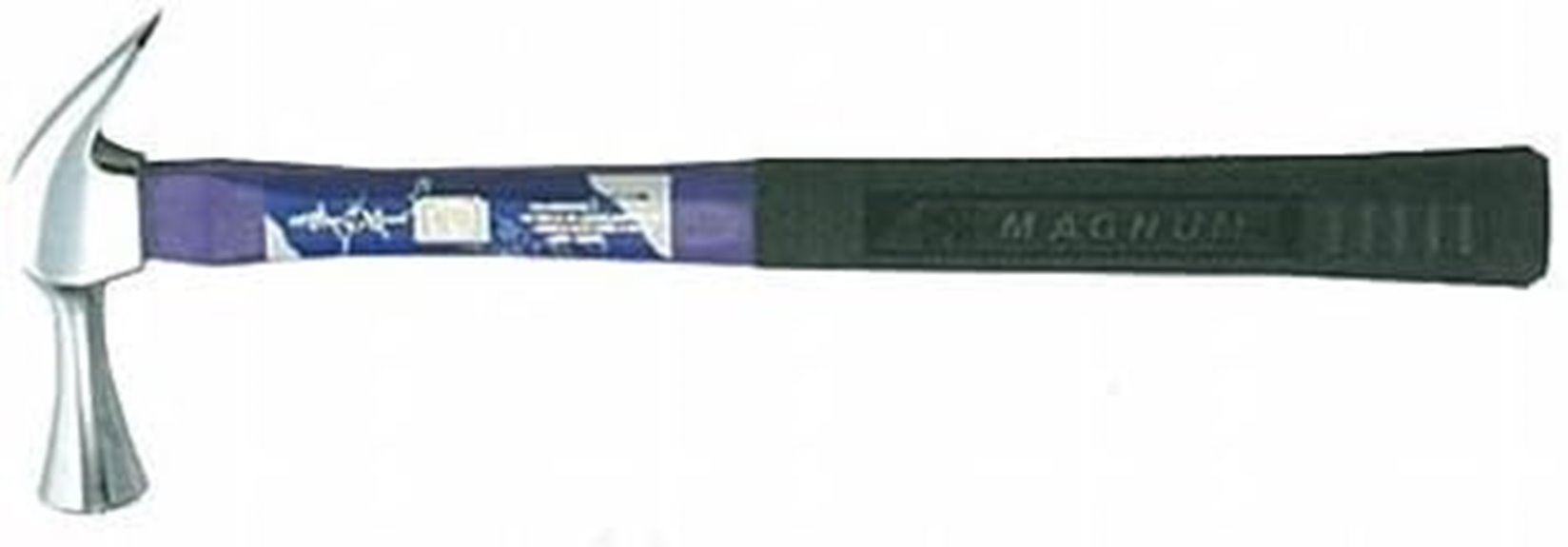
Designed for both professionals and DIY enthusiasts, the Ohsho Claw Hammer Medium stands out with its high-grade chrome-plated finish and ergonomic fiberglass handle. Its 385 mm length and 640 g weight make it well-balanced for precise, efficient work. The alloy steel head offers strength and durability, while the milled striking face guarantees a firm grip on nails. The fiberglass handle, wrapped in rubber, reduces hand fatigue during extended use. Its sleek black and silver design reflects Japanese craftsmanship, blending tradition with modern reliability. This hammer’s sturdy construction and comfortable grip make it a versatile choice for various carpentry tasks.
Best For: both professional carpenters and DIY enthusiasts seeking a durable, well-balanced claw hammer with a comfortable grip for precise and efficient work.
Pros:
- High-grade chrome-plated finish provides excellent durability and corrosion resistance.
- Ergonomic fiberglass handle with rubber wrapping reduces hand fatigue during extended use.
- Milled striking face ensures a firm grip on nails for accurate driving.
Cons:
- Slightly heavier than some similar models at 640 g, which may be tiring for prolonged use.
- Limited color options, primarily black and silver, may not suit all aesthetic preferences.
- As a Japan import, availability and replacement parts could be less accessible in certain regions.
Swiss Style Hammer, 2 Ounces, 9-1/8 Inches | HAM-212.00

For artisans seeking precise detail work, the Swiss Style Hammer, 2 Ounces, 9-1/8 Inches offers exceptional control thanks to its lightweight design and straight wood handle. Its small size makes it perfect for riveting, shaping, and delicate metalworking tasks. The hardwood handle provides a comfortable grip, while the wooden head ensures gentle, accurate strikes. With a total length of just over nine inches and a weight of only two ounces, it’s designed for finesse rather than brute force. Whether you’re crafting jewelry or fine metal components, this tool’s balance and control make it an invaluable addition to any artisan’s toolkit.
Best For: artisans and hobbyists who need precise, delicate metalworking, riveting, and shaping tools for detailed craftsmanship.
Pros:
- Lightweight design (2 ounces) for easy handling and control
- Straight wooden handle provides a comfortable grip
- Ideal for fine, precise work such as jewelry making and delicate metal shaping
Cons:
- Small size may be less effective for heavy-duty tasks
- Limited to light work; not suitable for high-force applications
- Wooden head may require careful use to prevent damage over time
Dai Dogyu Chisel Hammer, 10.58 oz. / 300g

If you’re seeking a reliable hammer that offers exceptional control and balance for Japanese woodworking, the Dai Dogyu Chisel Hammer, 10.58 oz. / 300g, should be at the top of your list. Its alloy steel head and textured wooden handle provide durability and a comfortable grip. Designed with flat and convex faces, it’s perfect for chisels, planes, and delicate adjustments. The overall length of 13-1/2 inches ensures precision while maintaining maneuverability. Weighing just over 10 ounces, it delivers controlled strikes without fatigue. This hammer combines traditional craftsmanship with modern performance, making it an ideal choice for both hobbyists and professionals seeking accuracy and balance.
Best For: hobbyists and professionals seeking precise control and balance in Japanese woodworking, especially for chisels, planes, and delicate adjustments.
Pros:
- Excellent control and balance for fine woodworking tasks
- Durable alloy steel head with traditional Japanese design
- Comfortable textured wooden handle suitable for medium-sized hands
Cons:
- Wedge holding the head may become loose over time
- Slightly less refined finish compared to high-end hammers
- Discontinued model, which may affect availability and warranty support
azumashuseki Japanese smoothing plane hand hammer blue 2 steel 65mm
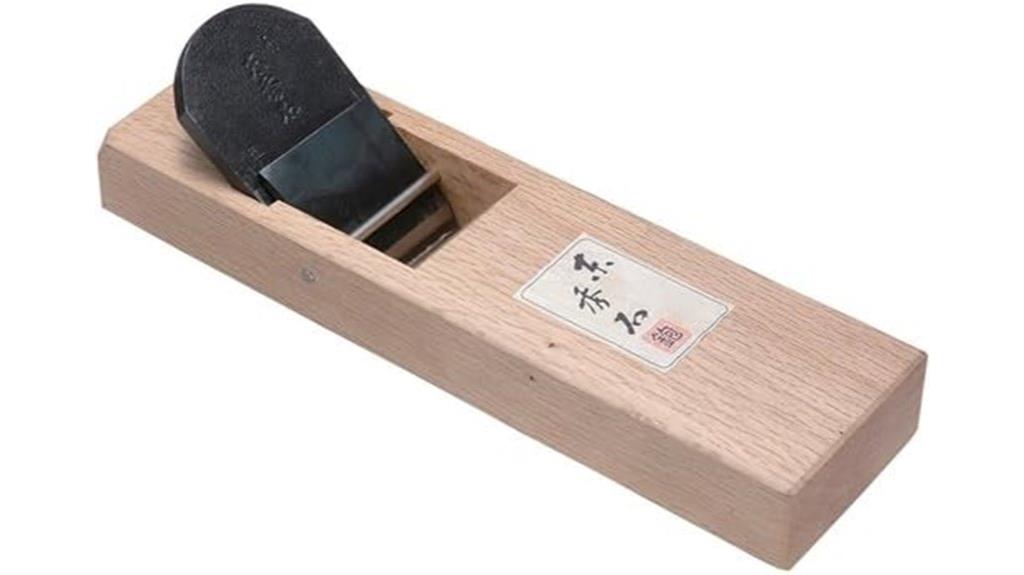
The azumashuseki Japanese smoothing plane hand hammer with blue 2 steel and a 65mm blade stands out as an essential tool for woodworking enthusiasts who value traditional craftsmanship combined with precise control. Crafted by Tsunesaburo, a renowned Japanese maker, this hand plane features a high-grade Aogami Blue 2 steel blade, hand-forged for ideal sharpness and durability. Its soft iron base and natural Japanese shirakashi wood stand provide a balanced feel and aesthetic appeal. Weighing around 1300 grams, it offers stability during use, making wood smoothing and molding effortless. This tool exemplifies the perfect blend of tradition and precision in Japanese woodworking.
Best For: woodworking enthusiasts and professional carpenters seeking a traditional Japanese smoothing plane with high-grade steel for precise and durable wood finishing.
Pros:
- Crafted with Aogami Blue 2 steel for exceptional sharpness and edge retention
- Balanced weight of approximately 1300 grams for stability and control during use
- Elegant natural wood stand and soft iron base enhance aesthetics and durability
Cons:
- Discontinued model may be difficult to find new or at a lower price
- Hand-forged steel and traditional materials require careful maintenance to prevent rust
- Slightly heavier than some modern planes, which may impact prolonged use comfort
KAKURI Japanese Carpenter Hammer SAKIKIRI Nail Punch
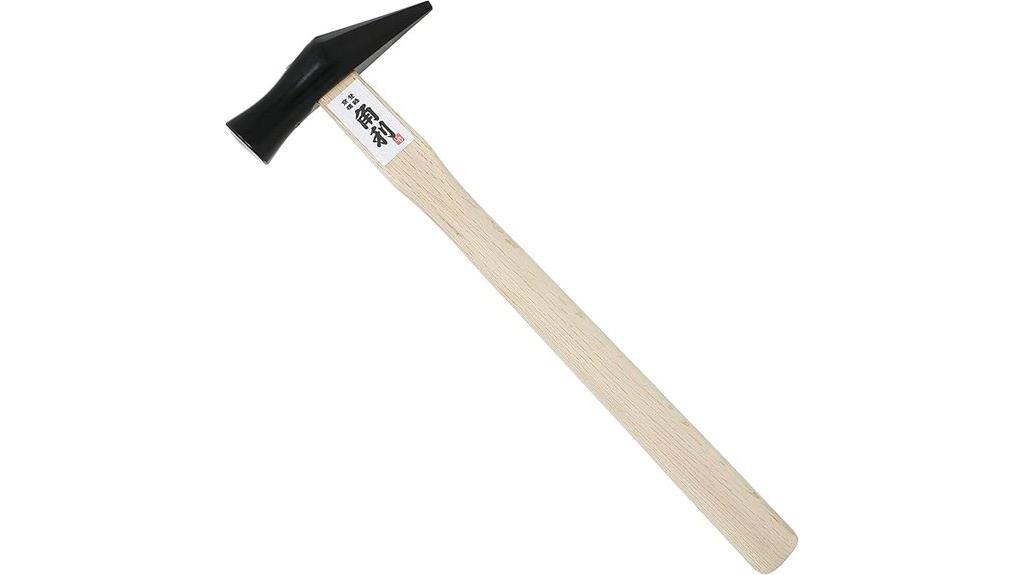
Designed for professional woodworkers, the KAKURI Japanese Carpenter Hammer SAKIKIRI combines hammering and nail-setting functions in a single, high-quality tool. Crafted from durable Japanese carbon steel, its forged head features double wedges for added strength and longevity. The pointed nail setter tip allows precise nail placement below the wood surface or for punching small holes. Its round head design offers versatility, while the comfortable Japanese oak handle ensures a secure grip during extended use. Weighing 13 ounces, this tool seamlessly integrates into woodworking tasks like nailing, chiseling, and plane setting, making it an essential, reliable part of any craftsman’s toolkit.
Best For: Professional carpenters and woodworking enthusiasts seeking a durable, versatile hammer with integrated nail-setting capabilities.
Pros:
- Crafted from high-quality Japanese carbon steel for exceptional durability and strength
- Combines hammer and nail setter functions, increasing efficiency and reducing tool switching
- Comfortable Japanese oak handle provides a secure grip for extended use
Cons:
- Weighs 13 ounces, which may be slightly heavy for prolonged use by some users
- Requires proper maintenance of Japanese steel components to prevent rusting
- Designed primarily for woodworking; may not be suitable for heavy demolition tasks
KAKURI Chisel Hammer GENNO 4 oz (115g) Japanese Woodworking Carpenter Hammer
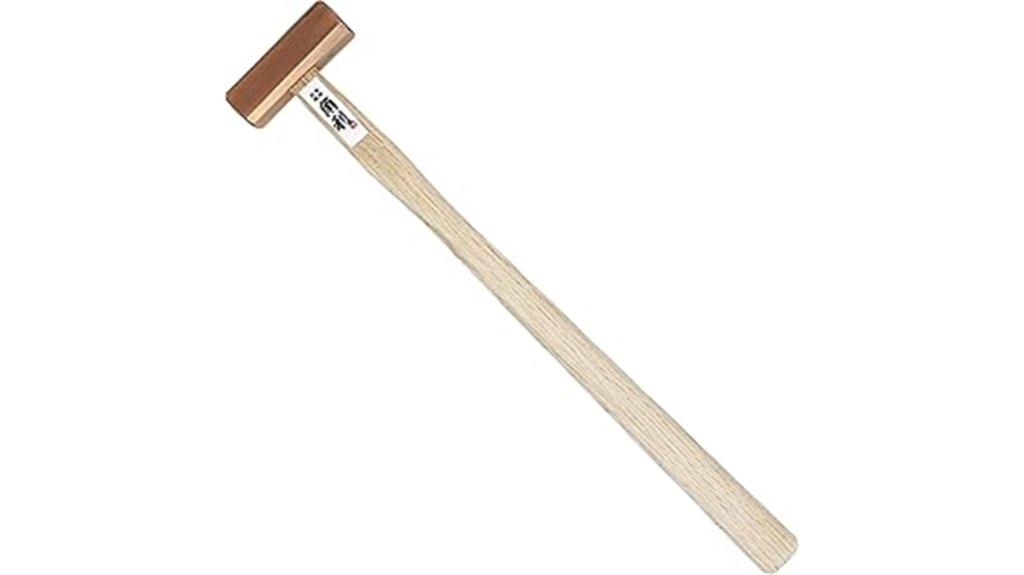
For those seeking a versatile and precise woodworking tool, the KAKURI Chisel Hammer GENNO 4 oz stands out with its double-faced octagonal head. Crafted from high-grade Japanese carbon steel with a bronze finish, it’s built for durability and aesthetic appeal. The flat face is perfect for starting nails, while the domed surface guarantees smooth finishing and surface preservation. Its 115g weight makes it ideal for delicate tasks, and the natural Japanese oak handle provides a comfortable, ergonomic grip. Handcrafted in Japan, this hammer combines traditional craftsmanship with modern efficiency, making it a reliable choice for fine woodworking and carpentry projects.
Best For: DIY woodworkers, professional carpenters, and craft enthusiasts seeking precise, versatile, and durable hammer for fine woodworking tasks.
Pros:
- Double-faced octagonal head offers multiple functions for starting and finishing nails with ease
- Crafted from high-grade Japanese carbon steel with a durable bronze finish for long-lasting use
- Natural Japanese oak handle provides an ergonomic grip and a traditional aesthetic
Cons:
- Weighs only 115g, which may be less suitable for heavy-duty pounding tasks
- Handcrafted in Japan might result in higher cost compared to mass-produced alternatives
- Smaller size and weight may require more effort for larger or more demanding projects
Japanese Forming Hammer 9 oz, Precision Embossing Hammer for Metal Working, Riveting, Crafts, Oak Wood Handle, Made in JAPAN
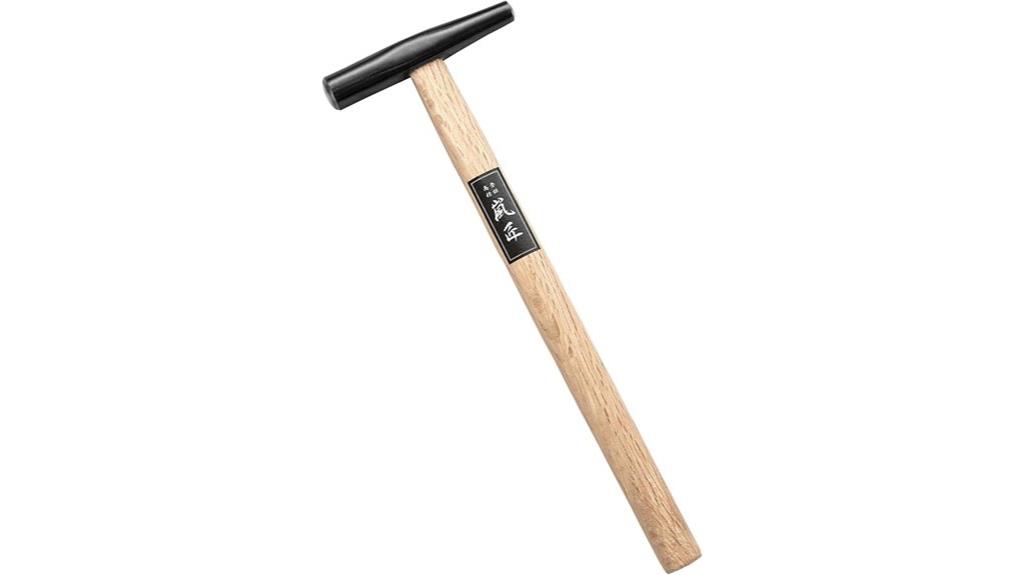
If you’re seeking a precise tool for metalworking or crafts, the Japanese Forming Hammer 9 oz stands out with its high-quality craftsmanship and specialized design. Made in Japan, it features a durable carbon steel head forged for strength, with an L-shaped wedge for intense use. The round oak wood handle offers a comfortable grip that improves over time, making it ideal for embossing, riveting, and creating textured patterns in metal. Weighing just 9 ounces, it provides excellent control without fatigue. This hammer combines traditional Japanese craftsmanship with modern precision, making it a reliable choice for professionals and hobbyists alike.
Best For: professional and hobbyist metalworkers, crafters, and artisans seeking precise, durable tools for embossing, riveting, and textured metalwork.
Pros:
- High-quality Japanese carbon steel head forged for durability and strength
- Comfortable round oak wood handle that improves with use
- Lightweight at 9 ounces offering excellent control and reduced fatigue
Cons:
- Some users report the head may be loose after extensive use
- Limited to hand-powered operation, not suitable for heavy-duty industrial tasks
- Possible variation in craftsmanship quality, with some concerns about meeting Japanese tool standards
Factors to Consider When Choosing Japanese Hammer Gennou Style
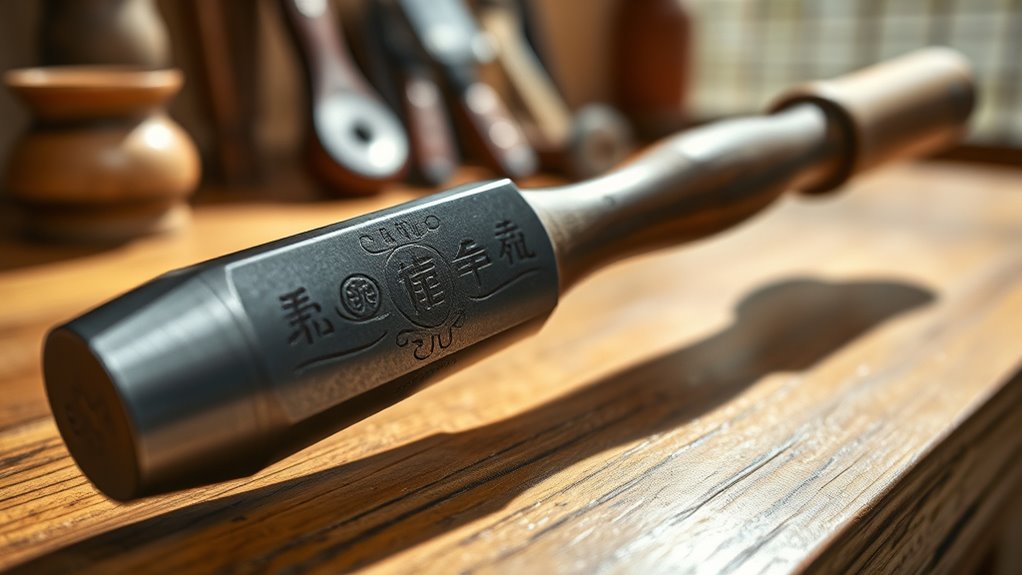
When choosing a Japanese Gennou hammer, I focus on several key factors to find the best fit. The quality of the blade material, handle comfort, and head weight all impact performance and ease of use. Considering the intended purpose and craftsmanship guarantees I select a style that’s both functional and true to tradition.
Blade Material Quality
Choosing the right blade material is essential because it directly affects the Gennou’s durability, precision, and overall performance. High-quality Japanese hammer blades are usually made from carbon steel, like Aogami Blue 2, renowned for its hardness and edge retention. These blades are often hand-forged and tempered, ensuring they withstand heavy impacts without chipping or deforming. A well-crafted blade features a smooth, polished surface with precise bevels, which allows for clean, accurate strikes and minimizes damage to the material. The steel’s carbon content and manufacturing process play a crucial role in maintaining sharpness and resisting wear over time. Many premium blades incorporate layered or laminated construction, balancing hardness with flexibility for better strength and longevity.
Handle Comfort & Grip
A comfortable Japanese hammer Gennou handle is essential for precision and safety during woodworking, and selecting the right material and design makes a noticeable difference. Natural woods like Japanese oak or cypress provide a warm, shock-absorbing grip that reduces hand fatigue and enhances control. An ergonomic contour that fits snugly in my hand minimizes strain during extended use, making work more comfortable. Textured or polished finishes on the handle improve grip security, preventing slips when striking or chiseling. Handle length is also vital; longer handles give more leverage and power, while shorter ones offer greater precision for delicate tasks. Ultimately, a secure attachment—often via wedges or specialized fittings—ensures the handle stays firmly in place, providing safety and stability during vigorous use.
Head Weight Balance
The weight of the hammer head plays a significant role in how effectively I can control my strikes and achieve precise results. Typically, I look for a head weight between 10.5 oz and 13.2 oz, which influences both force and accuracy. A well-balanced hammer ensures even weight distribution between the head and handle, reducing fatigue and improving control. This balance affects how smoothly I can swing, directly impacting my accuracy in delicate woodworking or finishing tasks. Proper head weight relative to the handle length allows for efficient momentum transfer without strain or loss of control. Choosing a hammer with the right balance helps me make precise, efficient strikes while minimizing damage to the material, essential for detailed carpentry work.
Craftsmanship & Finish
Because craftsmanship and finish directly impact both the durability and aesthetic appeal of a Japanese hammer Gennou style, I pay close attention to these details when selecting a tool. A high-quality hammer features a meticulously crafted finish that reflects expert craftsmanship and attention to detail. The smoothness and precision of the finish on the hammer head help prevent rust and minimize damage to wood or other materials. Traditional Japanese techniques emphasize hand-forged surfaces with minimal imperfections, showcasing the artisan’s skill and enhancing the tool’s beauty. The handle’s finish, often polished Japanese oak or cypress, influences grip comfort and balance. Additionally, seamless head-to-handle joints ensure long-term stability and reliable performance during woodworking, making craftsmanship and finish essential factors in my selection process.
Intended Use Suitability
Choosing the right Japanese hammer Gennou style depends heavily on matching its weight, size, and head shape to your specific woodworking tasks. For nailing or chiseling, a lighter, more maneuverable hammer offers better control, while heavier hammers are ideal for driving larger nails or shaping wood. The head shape also matters: flat heads are versatile, convex heads are gentler on surfaces, and belled heads excel for delicate adjustments. The handle material impacts comfort and grip, especially during extended work, with wood handles providing traditional feel and composites offering durability. Overall length influences leverage and precision; a longer hammer gives more power, but may reduce control in tight spaces. Match these features to your project needs to ensure efficiency and comfort.
Durability & Longevity
Durability and longevity of a Japanese Gennou-style hammer hinge on selecting high-quality materials and ensuring proper assembly. Using premium Japanese steel, like carbon or alloy steel, boosts the hammer head’s resistance to wear and damage, making it last longer through tough projects. Proper head attachment, with secure wedging and fitting, prevents loosening and extends the tool’s lifespan. Choosing a robust handle made from Japanese oak or hickory reduces breakage and withstands repeated impacts over time. Regular maintenance, such as cleaning, oiling, and inspecting for cracks or dents, helps preserve the hammer’s integrity. A well-crafted Gennou hammer, built with meticulous craftsmanship and high-grade materials, is designed to deliver reliable, long-lasting performance in demanding woodworking tasks.
Price & Value
When selecting a Japanese Gennou-style hammer, balancing price and value is key to making a smart investment. Higher-quality hammers often come at a premium but deliver superior durability, precision, and performance. It’s important to compare features like handle material, head steel quality, and design, rather than just focusing on the initial cost. Cheaper options might seem attractive but can lack the long-term reliability and craftsmanship of more expensive, handcrafted tools. Investing in a well-made hammer provides better weight distribution and control, which reduces fatigue and boosts work efficiency. Keep in mind that some affordable hammers may require adjustments or maintenance to reach the quality level of traditional Gennou tools. Choosing wisely ensures you get the best value for your money.
Frequently Asked Questions
What Distinguishes Japanese Gennou Hammer Styles From Western Hammer Designs?
Japanese gennou hammer styles differ from Western designs mainly in their focus on precision and craftsmanship. I’ve noticed that Japanese gennou hammers often have a more streamlined shape, with a beveled face for delicate work, and a wooden handle that absorbs shock better. Western hammers tend to prioritize brute force, with heavier heads and larger handles. I find Japanese styles more refined, blending tradition with a keen attention to detail.
How Does the Weight of a Japanese Gennou Hammer Affect Its Precision?
Think of a Japanese gennou hammer like a finely balanced scale. The weight directly influences its precision—heavier hammers deliver more force but can be harder to control, while lighter ones enhance accuracy but may require more strikes. I find that choosing the right weight depends on the task; a balanced gennou helps me strike with both power and finesse, ensuring precise work without sacrificing efficiency.
What Types of Wood Are Best Suited for Japanese Carpenter Hammer Handles?
I recommend using hickory or Ash for Japanese carpenter hammer handles. These woods are strong, resilient, and absorb shock well, which helps diminish fatigue during work. Hickory, in particular, is prized for its durability and toughness, making it ideal for heavy-duty tasks. Ash offers a lighter alternative with excellent shock absorption. Both options guarantee the handle withstands daily use while providing comfort and precision.
Are There Specific Japanese Gennou Hammer Styles for Particular Woodworking Tasks?
Ever wondered if specific Gennou hammer styles suit particular woodworking tasks? Absolutely! For delicate chiseling, I prefer lightweight, balanced styles that offer precision without fatigue. When tackling heavy framing, I opt for sturdier, larger heads that deliver powerful strikes. Each style is crafted for a purpose, blending tradition with functionality. Choosing the right Gennou enhances both your craftsmanship and the quality of your work.
How Do Traditional Japanese Techniques Influence Modern Gennou Hammer Craftsmanship?
Traditional Japanese techniques deeply influence modern gennou hammer craftsmanship by emphasizing balance, precision, and craftsmanship. I incorporate centuries-old methods like hand-forging and meticulous finishing to guarantee each hammer reflects cultural authenticity. These techniques help me create tools that are not only functional but also a nod to Japan’s woodworking heritage. I believe blending tradition with modern innovation results in gennou hammers that are both reliable and beautifully crafted.
Conclusion
As I’ve explored these incredible Japanese Gennou hammers, it’s funny how the perfect tool often finds you when you least expect it. Whether you’re into traditional carpentry or delicate metalwork, each style offers something unique. Sometimes, I think it’s no coincidence that these crafts have been refined for generations—they just seem to call out to the right hand at the right moment. Trust your instincts, and you might just discover your ideal hammer when you’re not even looking.
